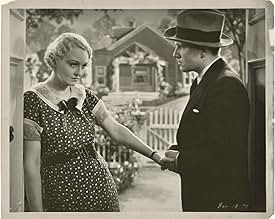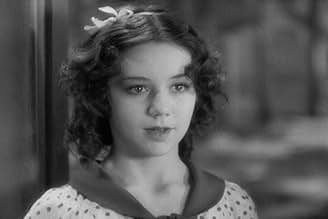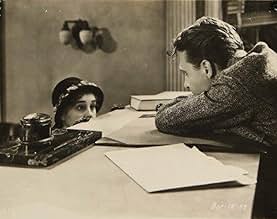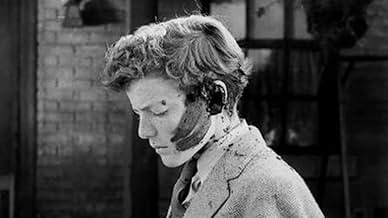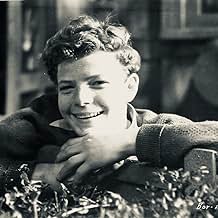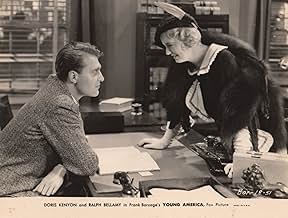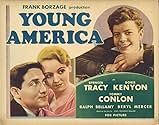Aggiungi una trama nella tua linguaAlready in trouble with the law, Arthur and his friend Nutty break into a drugstore to get medicine for Nutty's grandmother. The druggist's wife, Mrs. Doray, asks for custody. When he hears ... Leggi tuttoAlready in trouble with the law, Arthur and his friend Nutty break into a drugstore to get medicine for Nutty's grandmother. The druggist's wife, Mrs. Doray, asks for custody. When he hears them arguing over him, Arthur runs away. When he returns Mr. Doray is being held up by ban... Leggi tuttoAlready in trouble with the law, Arthur and his friend Nutty break into a drugstore to get medicine for Nutty's grandmother. The druggist's wife, Mrs. Doray, asks for custody. When he hears them arguing over him, Arthur runs away. When he returns Mr. Doray is being held up by bandits at the drugstore.
- Regia
- Sceneggiatura
- Star
- Premi
- 1 vittoria in totale
- Arthur Simpson
- (as Tom Conlon)
- Mabel Saunders
- (as Dawn O'Day)
- Maid
- (non citato nei titoli originali)
- Schoolteacher
- (non citato nei titoli originali)
- Aunt Mary's baby
- (non citato nei titoli originali)
- Cassie Taylor
- (non citato nei titoli originali)
- Undetermined Role
- (non citato nei titoli originali)
- Bull Butler
- (non citato nei titoli originali)
- Bandit
- (non citato nei titoli originali)
- Court Clerk
- (non citato nei titoli originali)
- Bandit
- (non citato nei titoli originali)
Recensioni in evidenza
Borzage manages to get some interesting performances out of the young actors: Tom Conlan, whose character is labeled as the worst boy in town, keeps getting into thoughtless scrapes. In fact, that's the best part of the script: the boys are not bad, but they just don't think of consequences.
The other thing about this movie that makes it better than average is, unsurprisingly, Spencer Tracy's performance. In the midst of all the sweet characters and one outright stinker, he adds a lot of salt to the stew as the grouchy pharmacist. His scene with Bellamy in which he continually gets fined for contempt of court is very funny. While not among Borzage's best work, this movie, as always, has enough points to make it worth your time.
The director's on-screen surrogate is Ralph Bellamy, introduced in the opening sequence as a progressive judge who makes it his business to listen to the boys, find out why they misbehave, and dole out appropriate sentences. He's fair but no pushover, and when one well-dressed boy smoothly delivers his testimony with a grin he astutely identifies the kid as a con artist. You know Bellamy's judge is a good guy from the way he sits at the judicial bench: he isn't ramrod straight, he slouches, parks his elbow on the desktop and props his head on his hand, listening intently as he leans towards the speaker. If you ever get in trouble and wind up in court, this is the kind of judge you'd want to face.
The central figure is an orphaned boy named Arthur Simpson, who is being raised in squalor by a cold-hearted aunt with no husband and three children of her own. Art is in trouble constantly, but his motives are usually good onesso much so that, after a while, our credulity is strained. A well-heeled lady named Edie Doray takes a sympathetic interest in the boy and volunteers to take him into her home as her ward, despite the vocal opposition of her perennially grouchy husband Jack, the proprietor of a drug store. After various complications and much suffering for young Art, who seems to be a magnet for trouble, the boy redeems himself (in a wildly implausible, action-packed finale) and everyone, even Jack Doray, comes to recognize his good qualities.
"Young America" starts well and holds viewer interest much of the way, but problems kick in around the midway point as the story turns increasingly improbable and sentimental. Tommy Conlon is quite good as Arthur Simpson, but the character as written is impossibly noble, forever misunderstood and put-upon. In the face of injustice Art maintains a disturbing, Job-like passivity. Several times the locals refer to him as "the worst boy in town," and if that's true they're awfully lucky. Mickey Rooney's character in "Boy's Town" is more of a hardened troublemaker than this guy. Most kids in Art's position would be openly angry and raise a lot more hell than he ever does, and a stronger screenplay might have granted him more nuance, but like Father Flanagan the writers of "Young America" seem to believe there's no such thing as a bad boy (well, except for a couple of bad eggs we meet briefly along the way) and are determined to prove that all these kids need is the opportunity to explain themselves and a second chance in life, and everything will be fine. If only life could be so simple!
Speaking of Father Flanagan the biggest lure this film has to offer modern day viewers is the performance of 32 year-old Spencer Tracy as Jack Doray, the druggist. It's a little strange to see Tracy this young, but the regular-guy gruffness and authoritative voice so familiar from his later movies are present, and he demonstrates with ease that he already had the acting chops to breathe life into an ill-defined character. Tracy was under contract to Fox Films during the first five years of his movie career, 1930-35, and was said to be unhappy with most of the projects he was assigned; it's safe to assume that this was one of the roles he didn't like. We're never told much about Jack Doray. We never learn why he's such a grouch or why he takes an instant dislike to Art Simpson, or for that matter why his wife puts up with him. When, in the final scenes, Doray suddenly sees the light and recognizes Art's goodness, only an actor of Tracy's caliber could make the turnabout feel at all credible.
The finale involves a stick-up by crooks and a crazed car chase staged mostly before rear-projection screens, and it bears so little resemblance to what we've been watching it feels as if it was spliced in from a different movie. (Amusingly, the original posters and lobby cards for the film emphasized this sequence, which must have left more than one ticket-buyer bewildered and disappointed.) It concludes the show on a rousing note, but also reminds us that while "Young America" is a moderately interesting viewing experience it doesn't live up to the promise of its opening scenes.
"Young America" opens with a ten minute segment set in juvenile court where the much laid-back Judge Blake (Ralph Bellamy), sans his dark robe, sitting in a very relaxing manner, while individually listening to testimonies on what took place leading to such boys as Charlie, Freddie O'Neil, Washington Lincoln Jenkins, and Sam, in his courtroom. Seated next to the judge is Edith Doray (Doris Kenyon), gathering information for the Woman's Club. The last boy to face Judge Blake is Arthur Simpson (Tommy Conlon), an orphan raised by his unsympathetic aunt, Mary Taylor (Sarah Padden, raising three younger children of her own. Because Arthur is constantly in trouble, whether being his fault or not, his aunt later address the judge as he being a "worthless good-for-nothing brat," and would have nothing more to do with him. Aside from getting into an after school fight with a bully, "Bull" Butler (Spec O'Donnell) for annoying Mabel Saunders (Dawn O'Day, later Anne Shirley), and for calling his friend, Edward "Nutty" Beamish (Raymond Borzage) "four eyes" for wearing glasses, Arthur gets suspended from school by his teacher (Jane Darwell). Arthur, age 13, who steals cars as well as driving them around town, finds comfort in the home of Nutty's grandmother (Beryl Mercer), who cares for him as if he were her own grandson. Of the boys she's seen in the courtroom, Mrs, Doray takes a special interest in Arthur, especially after he saves her dog from getting run over by a truck. As a reward, she talks her husband, John (Spencer Tracy), into giving him a job in his drug store after school for $6 a week. As much as Mr. Doray dislikes Arthur, treating him as all the others as a juvenile delinquent who'll never amount to anything but jail, he finds himself taking custody of the now homeless teen in his home at the request of his wife who feels "there's no such thing as a bad boy." Because of this, their once happy marriage becomes a troubled one. With one thing leading to another, and going against the judge's probation period, it becomes an uncertainty whether Arthur will ever be placed in a loving home or in a reform school.
Based on a play by John Frederick Ballard, YOUNG America was reportedly filmed before in the silent era sometime in 1918 and theatrically released around 1922 featuring Charles Frohman-Everett as Arthur Simpson. 20th Century-Fox would reuse the title of YOUNG America for its 1942 second feature release starring Jane Withers and Jane Darwell, but with a different storyline entirely. Yet, this edition of YOUNG America is made interesting largely due to the lead casting of Spencer Tracy and/or direction of Frank Borzage, possibly the reason for it being taken from film vaults and distributed to DVD (with Borzage's other 1932 release of AFTER TOMORROW starring Charles Farrell and Marion Nixon on its flip side).
For its notable quote of "There's no such thing as a bad boy," used much later by Spencer Tracy for his Academy Award winning performance as Father Flanagan in BOYS TOWN (MGM, 1938) and its sequel, MEN OF BOYS TOWN (1941), indicates that line did not originate from BOYS TOWN after all. With Tracy's Father Flanagan being sympathetic and helping troubled youths of America in those films, he's quite the opposite here, with his wife, lovingly played by Doris Kenyon, who sticks by her principles. An honorable mention goes to Raymond Borzage, the director's son, in a believable and most natural performance as Arthur's pal, "Nutty," an intellectual with weak eyes (hence the thick glasses) whose hobby is inventing things. Others in the cast include Robert Homans (Patrolman Weems); William Pawley and Eddie Sturgis. Look quickly for Louise Beavers briefly spotted in a non-speaking role as the Doray maid.
Sentimental and at times melodramatic in the Frank Borzage tradition, YOUNG America is definitely worth seeking, and certainly one for the time capsule from Hollywood's golden age. (**1/2)
The film belongs to Tommy Conlan and Raymond Borzage. Tommy comes from a real white trash background and he's got a lot of anger issues and who wouldn't if I lived as an orphan with his aunt Sarah K. Padden who is hardly the nurturing type. Conlan finds it a lot more congenial with his friend Borzage's family which is his grandmother Beryl Mercer. Conlan by a certain consensus is supposedly the worst kid in the city. Yet people like Judge Ralph Bellamy and Doris Kenyon wife of pharmacist Spencer Tracy see something good and salvageable.
In a new biography of Spencer Tracy it's states that while Tracy was glad to work with director Frank Borzage he was clearly not happy with Fox Studios assigning him to a supporting role in reality if not in billing. Later on when he was assigned and billed accordingly such a role in Captains Courageous to Freddie Bartholomew he walked off with his first Oscar. But he's given little opportunity or time on the screen to do that here.
Conlan and young Borzage (he's the director's nephew) really register well. Borzage is what today would be termed a nerd yet he and Conlan because of Mercer's affection for Conlan form a very nice Tom Sawyer/Huck Finn type bond. Frank Borzage has come down to us as a director of tender and sometime tragic love stories. He puts that skill to work with great effectiveness here. Tommy and Raymond enact a tender death scene that would rival what Borzage did with Margaret Sullavan in Three Comrades and The Mortal Storm a couple of better known Borzage works at MGM. I was deeply moved by it.
Fox Studios was having its financial problems during the Great Depression and didn't invest much in production values for Young America. Spencer Tracy was a B picture star for the most part. In the last days of Fox Films before they merged with 20th Century Pictures the A list stars were Will Rogers and Janet Gaynor. Still Young America is a poignant story and credit goes to the great chemistry and great acting of Tommy Conlan and Raymond Borzage.
*** (out of 4)
Uneven but entertaining drama has teen Arthur (Tommy Conlon) being accused of being the worst kid in town. Trying to help a friend's grandmother, he breaks into a store to steal some medicine but is caught. In court the judge (Ralph Bellamy) is about to send him to a juvenile jail but the store owner (Spencer Tracy) and his wife (Doris Kenyon) end up taking the kid home. The store owner is against it but the wife believes a good home can change a bad kid. This is a fast paced and entertaining little film even though the subject matter brings up some rather false notes as well as being too heavy at times. The biggest fault I had with the movie is that it tries to argue that bad kids can be good if they have a loving family and a nice place to live yet the main guy here, Arthur, isn't ever shown as a bad kid. He gets in trouble two separate times but both times he does so for the good of another person. Since he's doing good deeds it's hard for the film to argue about what bad kids need. With that said, the movie still works due in large part to some very good performances. Tracy gets top-billing but he's basically just here in a supporting role. He offers up another fine performance as he has no trouble playing the jerk who wants to see the young kid thrown in jail. Kenyon is equally good as the woman who wants to change the kid. Conlon never had much of a career, which is somewhat a surprise since his performance is better than many other child stars of his time. The director's son plays Arthur's best friend and does a nice job as well. Ralph Bellamy gets third viewing but this is pretty much his film as a judge who tries to understand troubled kids. The caring nature of the character is really brought out by Bellamy who sadly has been forgotten as an actor, which is a shame because he was one of the best character actors out there.
Lo sapevi?
- QuizDespite receiving top billing, Spencer Tracy appears in only about 19 minutes, or roughly 27 percent of the film.
- Citazioni
Judge Blake: Washington Lincoln Jackson?
Washington Lincoln Jackson: Yes, sir.
Judge Blake: Have you ever been here before?
Washington Lincoln Jackson: No sir. And I wouldn't be here now 'lessin' I was forced to come.
Judge Blake: I suppose you know why Officer Weems arrested you.
Washington Lincoln Jackson: Yessir. Because I was the smallest kid he could catch.
- ConnessioniRemake of Young America (1918)
I più visti
Dettagli
- Tempo di esecuzione1 ora 10 minuti
- Colore
- Proporzioni
- 1.37 : 1
Contribuisci a questa pagina


